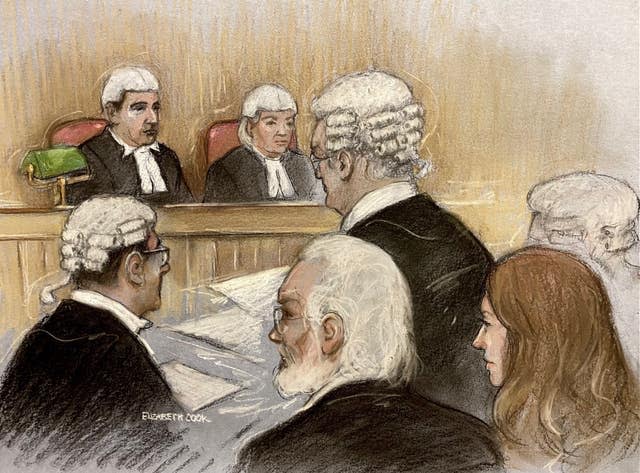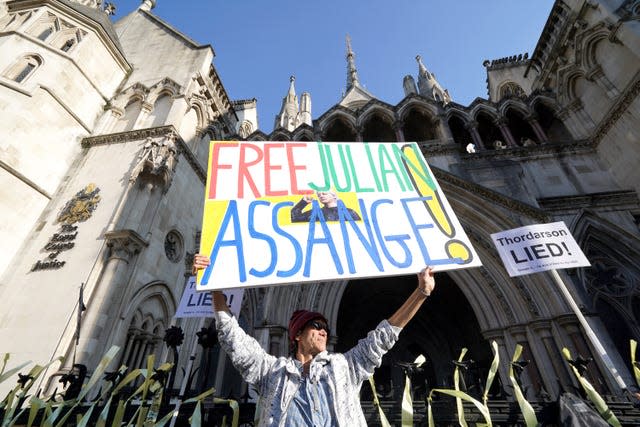Case against Assange is ‘offensive’, his wife says after bid to appeal granted

Julian Assange’s wife has called for the United States to drop efforts to prosecute the WikiLeaks founder after he won a bid to bring an appeal against his extradition at the High Court.
Assange faces prosecution in the US over an alleged conspiracy to obtain and disclose national defence information following the publication of hundreds of thousands of leaked documents relating to the Afghanistan and Iraq wars.
During a two-day hearing in February, lawyers for the 52-year-old asked for the go-ahead to challenge a previous judge’s dismissal of his case to prevent his extradition.
Dame Victoria Sharp and Mr Justice Johnson dismissed most of Assange’s legal arguments but deferred their final decision, adding that unless “satisfactory” assurances were given by the US, he would be able to bring an appeal on three grounds.
Those assurances were that Assange would be protected by and allowed to rely on the First Amendment – which protects freedom of speech in the US – that he is not “prejudiced at trial” due to his nationality, and that the death penalty is not imposed.
And, at a hearing on Monday, the two judges granted permission for the challenge over the freedom of speech and nationality points, meaning Assange will be able to bring the appeal.
Hundreds of people had gathered outside the Royal Courts of Justice in London for the hearing, with supporters cheering as news of the decision filtered out of the courtroom.
Speaking after the hearing, Assange’s wife Stella Assange, said that judges “reached the right decision” and called on the US to drop the “shameful” case.
She said: “We spent a long time hearing the United States putting lipstick on a pig, but the judges did not buy it.

“As a family we are relieved, but how long can this go on? The United States should read the situation and drop this case now.”
Mrs Assange said the case was “taking an enormous toll on Julian” and that he had been in Belmarsh prison in south east London for over five years.
She continued: “We are relieved as a family that the courts took the right decision today but how long can this go on for? Our eldest son just turned seven.
“All their memories of their father are in the visiting hall of Belmarsh prison, and as the case goes along, it becomes clearer and clearer to everyone that Julian is in prison for doing good journalism, for exposing corruption, for exposing the violations on innocent people in abusive wars for which there is impunity.”
Mrs Assange concluded: “Everyone can see what should be done here. Julian must be freed. The case should be abandoned. He should be compensated.
“He should be given the Nobel prize and he should walk freely with the sand beneath his feet. He should be able to swim in the sea again. Free Assange.”

During the approximately two-hour hearing, lawyers on behalf of the US had said Assange’s bid to bring an appeal should be refused given the promises, provided in a note from the US embassy in London.
James Lewis KC said in written submissions that there is “no question” that Assange, if extradited, “will be entitled to the full panoply of due process trial rights, including the right to raise, and seek to rely upon, the first amendment as a defence”.
But Edward Fitzgerald KC, for Assange, said most of the promises were “blatantly inadequate” but that they had accepted the promise about the death penalty.
Discussing the other points, the barrister said: “This assurance is not and cannot be a knockout. It cannot reassure the court that there is no risk.”
In their previous judgment, which deferred some of the arguments to Monday’s hearing to allow for the assurances from the US, Dame Victoria and Mr Justice Johnson said: “If he is not permitted to rely on the First Amendment because of his status as a foreign national, he will thereby be prejudiced, potentially very greatly prejudiced, by reason of his nationality.”
She concluded: “It follows that it is arguable that the applicant might be treated differently at trial on the grounds of his nationality.”
In a January 2021 ruling, then-district judge Vanessa Baraitser said Assange should not be sent to the US, citing a real and “oppressive” risk of suicide, while ruling against him on all other issues.
Later that year, US authorities won their High Court bid to overturn this block, paving the way towards Assange’s extradition.
However, if ultimately successful with his appeal, Assange could avoid extradition, though a further appeal from the US would be likely.


